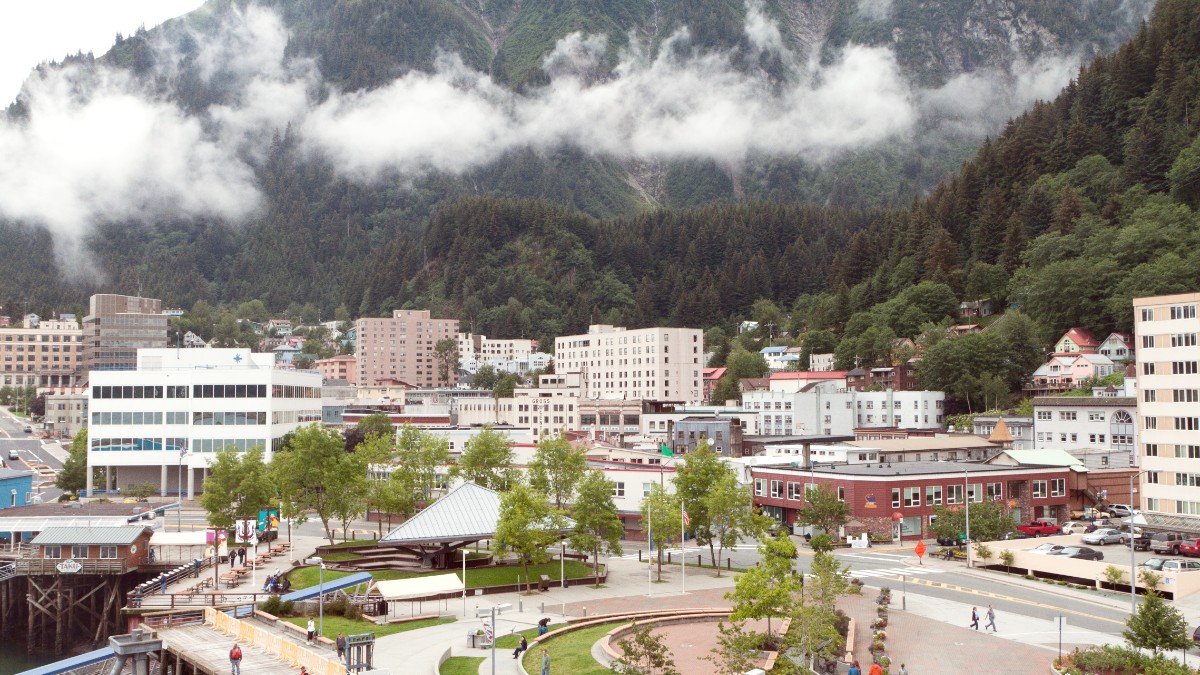
Alaska, USA
Juneau's climate is distinct, shaped by its temperate rainforest environment.
Each season features distinct advantages and disadvantages for visitors.
Juneau’s temperate rainforest environment means you expect rain at any time, even during the summer. Dressing in layers suits comfort and adaptability. Snowfall can be considerable in winter, influencing road conditions and access to some areas. Winds can be strong, especially near the water or on exposed mountain trails. Always check the local forecast before heading out for the day. Prepare for rapid changes in conditions; a clear morning quickly turns into a rainy afternoon.
Plan your visit around the activities you prioritize.
Crowded, higher prices.
Warmest weather, longest daylight, all tours and attractions operate, peak wildlife viewing, cruise ship season at its height.
Most crowded, highest prices for accommodations/tours, popular attractions see heavy visitor traffic.
Fewer crowds, unpredictable weather.
Fewer crowds, often lower prices, generally good weather (especially early May and late September).
Unpredictable weather, cooler temperatures, more rain, some seasonal tours limited/closed.
Fewest crowds, lowest prices.
Fewest crowds, lowest prices, opportunities for winter sports, Northern Lights viewing (less reliable).
Coldest temperatures, short daylight, heavy precipitation, many tourist businesses closed, limited tour options.
Plan your visit around the activities you prioritize. Late April to early September offers the best viewing opportunities for Whale Watching, with the peak period from June to August. Hiking is best from June to September, as trails are accessible and clear of snow.
Mendenhall Glacier Exploration remains accessible year-round, but summer features accessible trails and full visitor center services. Kayaking and Paddling are best from June to August for warmest water and calmer conditions. Cruise Ship Travel aligns with the high season (late May to early September). Northern Lights viewing is possible from late September to early April, needing clear, dark nights away from city lights; Juneau's frequent cloud cover often hinders viewing compared to interior Alaska.
Consider traveling during the shoulder season (May or September) for a balance of decent weather, fewer crowds, and lower prices.
Booking flights and lodging in the off-season offers more flexibility and potentially better rates.
Always check the local forecast and prepare for rapid changes in conditions, regardless of the season.
Align your visit dates with your main activity interests for the best experience.
The low season provides a quieter, more local experience for those seeking a tranquil visit.
Juneau is a destination with higher costs, notably during the peak summer season.
These are daily estimates and vary based on your choices.
For those seeking premium experiences.
This budget offers practical considerations for cost-conscious travel.
Travel insurance is highly advisable for any trip to Juneau. A comprehensive policy should cover aspects of your journey.
Coverage for unexpected medical treatments or emergencies during your trip.
Coverage for transport to a medical facility if needed, especially important for remote areas.
Protection for unforeseen events like bad weather, illness, or other disruptions to your travel plans.
Lost or delayed luggage
Research policies carefully to find one that suits your travel style and covers potential Alaskan adventures like helicopter tours or remote excursions.
A Travel insurance guide book can assist in understanding different policy options. For medical and travel coverage for visitors to the U.S., consider Insubuy.
Services like AirHelp handle claims for delayed or canceled flights, which travel insurance may also cover.
No visa or special permits needed. Valid government-issued photo ID suffices.
Passport for air travel. For land/sea, passport, Enhanced Driver's License (EDL), or NEXUS card. No visa for tourism/business under 6 months.
Familiarize yourself with common risks and prevention. Travel insurance is highly advisable for any trip to Juneau.
Tipping is standard practice in the U.S. For service industries.
Tip 15-20% of the bill for good service. For exceptional service, you might tip more.
Bars: $1-$2 per drink, or 15-20% of the total bill. Taxis/Shuttles: A tip of 15% of the fare is common.
Tour Guides: 15-20% of tour cost. Hotel Staff: Bellhops $2-$5 per bag, Housekeepers $2-$5 per day.